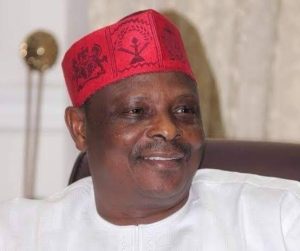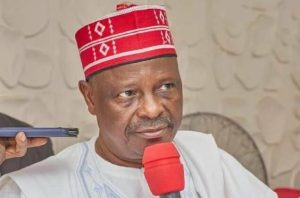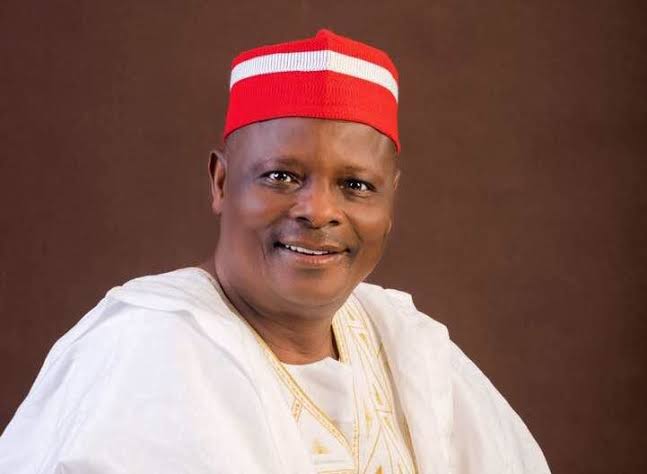Mohammed Kwankwaso, FNSE FNIQS, is a Nigerian politician.
He held the position of governor of Kano state twice, from 1999 to 2003 and from 2011 to 2015. Following his defeat in the 2003 re-election, he served as the first Minister of Defence of the Fourth Republic, despite lacking a military background, from 2003 to 2007, during President Olusegun Obasanjo’s administration. He later served one term in the Senate, representing Kano Central Senatorial District under the All Progressives Congress (APC) from 2015.
Early life and Education 
Rabiu Musa Kwankwaso, born on October 21, 1956, in Kano, hails from a Sunni Fulani family of the Genawa Fulani Clan. His father held prominent positions within the community, serving as the village head of Kwankwaso and later as the District Head of Madobi under the Kano Emirate Council led by the 13th Fulani Emir of Kano, Alhaji Ado Bayero CFR, LLD, JP.
In terms of education, Kwankwaso attended Kwankwaso Primary School, Gwarzo Boarding Senior Primary School, Wudil Craft School, and Kano Technical College before pursuing his studies at Kaduna Polytechnic, where he obtained both his National Diploma and Higher National Diploma. He actively participated in student leadership roles during his schooling and was elected as an official of the Kano State Students Association.
Furthermore, he pursued postgraduate studies in the United Kingdom from 1982 to 1983 at the Middlesex Polytechnic and Loughborough University of Technology, where he earned a master’s degree in civil engineering in 1985. Additionally, he was awarded a Ph.D. in civil engineering from Sharda University, India, in 2022.
Career
In 1992, Kwankwaso embarked on his political journey with the Social Democratic Party (SDP), aligning himself with the People’s Front faction led by General Shehu Yar’adua and notable politicians such as Senator Magaji Abdullahi, Babagana Kingibe, Atiku Abubakar, Bola Tinubu, Tony Anenih, Chuba Okadigbo, Abdullahi Aliyu Sumaila, Abubakar Koko, and Lamidi Adedibu, among others.
He secured a seat in the House of Representatives representing Madobi Federal Constituency during the 1992 elections. His subsequent elevation to the position of deputy speaker brought him into the national political spotlight. Additionally, he participated as a delegate from Kano in the 1995 Constitutional Conference, representing the People’s Democratic Movement under Yar’adua’s leadership.
Transitioning through Nigeria’s political landscape, Kwankwaso joined the Democratic Party of Nigeria (DPN) during General Sani Abacha’s political transition program.
In 1998, he became a member of the People’s Democratic Party (PDP), initially joining under the People’s Democratic Movement in Kano, led by Mallam Musa Gwadabe, Senator Hamisu Musa, and Alhaji Abdullahi Aliyu Sumaila. In 1999, he contested in the PDP primaries alongside Abdullahi Umar Ganduje, Mukthari Zimit, and Alhaji Kabiru Rabiu, with the Santsi/P.S.P. faction backing Ganduje’s candidacy, although a consensus was reached during the primaries.
During his first term as governor of Kano State, from May 29, 1999, to May 29, 2003, Kwankwaso faced significant opposition due to his assertive governance style and his alignment with Yoruba President Olusegun Obasanjo. Despite his efforts, he lost the re-election bid in 2003 to his rival, Malam Ibrahim Shekarau.
Securing a second term, Kwankwaso served as governor from May 29, 2011, to May 29, 2015. During this period, he focused on revitalizing Kano State’s infrastructure, including the construction of roads, hospitals, and schools, and facilitating educational opportunities abroad for residents. In August 2013, he joined the G-7 faction within the Peoples Democratic Party, and later that year, he defected to the All Progressives Congress (APC) along with five other G-7 members.
In June 2014, Kwankwaso clashed with the long-time Emir of Kano, Ado Bayero, regarding the appointment of the Waziri (Vizier) of the Kano Emirate Council. Following Bayero’s death on June 6, 2014, a succession crisis emerged, and Sanusi Lamido Sanusi was appointed as the new Emir of Kano on June 8, 2014. This decision sparked protests from supporters of Sanusi Ado Bayero, with allegations that Kwankwaso’s support for Sanusi was linked to the 2015 presidential election.
In October 2014, leveraging his substantial political support in Kano, Kwankwaso entered the APC presidential primaries. However, he secured second place in the primaries held in Lagos, with Muhammadu Buhari emerging as the winner with 3,430 votes. Kwankwaso received 974 votes, followed closely by Atiku Abubakar with 954 votes. Rochas Okorocha garnered 400 votes, while Sam Nda-Isiah received 10 votes. Despite his second-place finish, Kwankwaso endorsed Muhammadu Buhari, the primary winner.
Kwankwaso served as the representative for Kano Central Senatorial District in the Nigerian Senate from May 2015 to May 2019.
In July 2018, Kwankwaso, along with fourteen serving senators of the APC, switched allegiance to the Peoples Democratic Party (PDP). Subsequently, in October 2018, he contested the PDP presidential primaries. Despite his efforts, he secured fourth place among twelve presidential aspirants, trailing behind Atiku Abubakar, Aminu Tambuwal, and Bukola Saraki. Kwankwaso threw his support behind Atiku Abubakar, the primary winner, and opted not to seek re-election to the Senate, with Ibrahim Shekarau taking his place.
During this time, Kwankwaso campaigned vigorously for his son-in-law, Abba Kabir Yusuf, in the Kano State gubernatorial race. However, the election was later declared inconclusive, favoring the incumbent Abdullahi Umar Ganduje.
On February 22, 2022, Kwankwaso established the National Movement as a political platform aimed at challenging the dominance of the All Progressives Congress and the Peoples Democratic Party. He incorporated the New Nigeria Peoples Party into the movement and assumed the role of national leader of the party on March 30, 2022.
In 2014, Kwankwaso declared his candidacy for the Nigerian presidency under the newly formed opposition party, the APC. Despite his efforts, he finished second in the party’s primary election in Lagos, with Gen. Muhammadu Buhari emerging as the winner, eventually becoming the President of Nigeria in the 2015 general election.
Following a rift with his former Deputy Governor, Abdullahi Ganduje, Kwankwaso exited the APC and joined the PDP. In 2018, he contested in the PDP presidential primary held in Port Harcourt, securing fourth place, while Atiku Abubakar emerged as the primary winner. However, Atiku ultimately lost in the 2019 general election.
In 2022, Kwankwaso switched allegiance once again, this time joining the New Nigeria Peoples Party (NNPP). He successfully contested and won the presidential primary held in Abuja later that year. During the 2023 Nigeria presidential election, Kwankwaso and his running mate, Bishop Isaac Idahosa, secured fourth place with nearly 1.5 million votes. Prior to the general election, Kwankwaso was among the candidates invited to the Royal Institute of International Affairs, Chatham House, UK, to present his vision for Nigeria.
Personal life
Kwankwaso tied the knot with his wife, Salamatu Rabiu Musa, in 2000, and they have been blessed with six children.
Net Worth
Undisclosed


